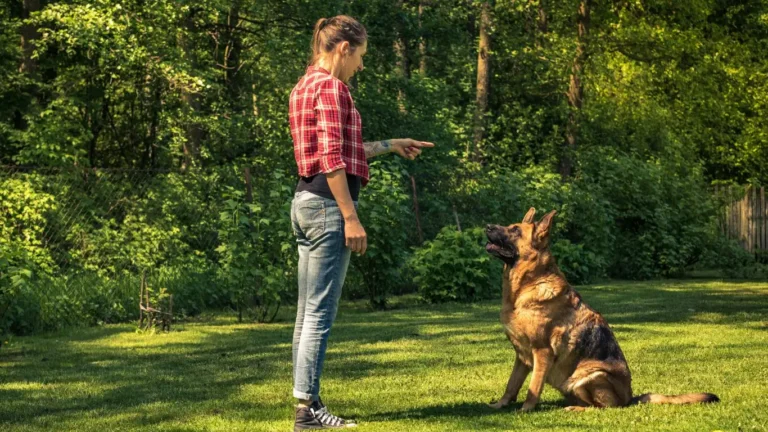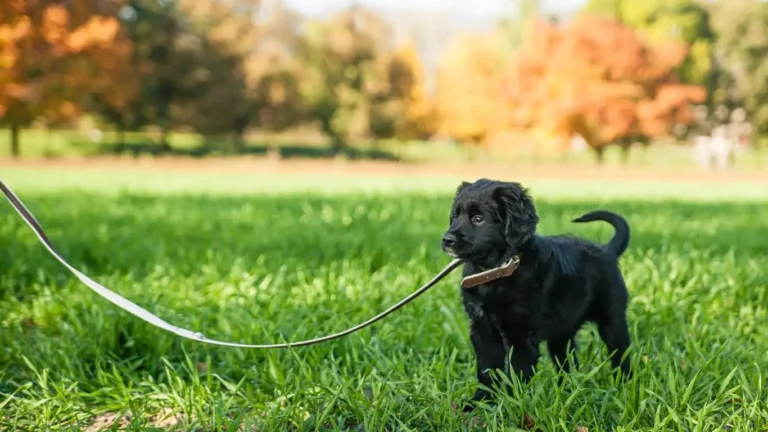Stop Your Dog’s Howling at Sirens – Proven Training That Works!
If your dog starts howling every time an ambulance or police siren wails in the distance, you’re not alone. Many dog owners struggle with figuring out how to train a dog to stop howling at sirens. It can be frustrating, especially if your pup’s howling is waking up the entire neighborhood! I’ve worked with countless dogs that react to sirens, and while it might seem like an unsolvable problem, trust me—there’s hope.
Why Do Dogs Howl at Sirens?

Before we dive into training, it’s important to understand why dogs react this way in the first place. From my years as a dog trainer, I’ve seen several common reasons:
- Instinctive behavior: Wolves use howling to communicate over long distances, and domestic dogs have inherited this trait.
- Response to high-pitched sounds: Sirens mimic the frequency range of a howl, which can trigger an instinctive vocalization.
- Seeking attention: Some dogs learn that howling gets them noticed, even if it’s just their owner telling them to stop!
- Anxiety or stress: If your pup is already prone to anxiety, sudden loud sounds may intensify their stress.
While some dogs stop howling at sirens naturally, others need a little extra help. If your dog is one of the persistent ones, don’t worry—let’s get into the solutions!
How to Train a Dog to Stop Howling at Sirens

Every dog is different, so the key is to use the right approach for your pup’s personality. Here’s a breakdown of the best training techniques:
1. The “Quiet” Command
Teaching your dog a reliable “quiet” cue is an essential tool for stopping excessive vocalization. Here’s a simple step-by-step guide:
- Wait for your dog to start howling (or trigger the sound with a recording of a siren).
- Let them howl for a second, then say “quiet” in a calm but firm tone.
- Hold a treat in front of their nose. Most dogs will pause howling to sniff it—reward them immediately.
- Repeat this several times until your dog starts associating the word “quiet” with stopping howling.
Pro tip: I’ve had great success using this method with my clients, but patience is key! Some dogs pick it up in a few days, while others take a couple of weeks.
2. Desensitization Training
If your dog panics or gets overstimulated by sirens, gradually exposing them to the sound at low levels can help. Here’s how to do it:
- Find a recording of sirens and play it at the lowest volume while giving your dog treats.
- Slowly increase the volume over time, always rewarding calm behavior.
- Practice regularly until your dog no longer reacts strongly to the sound.
This method works exceptionally well for noise-sensitive dogs. I once worked with a German Shepherd who would go into full-blown howling mode at the faintest siren. After a few weeks of desensitization, he learned to stay relaxed even when an ambulance zoomed by.
3. Distracting with an Engaging Activity
Another great strategy is to keep your dog’s focus elsewhere when a siren blares. Try these tricks:
- Engage them in a quick training session (sit, stay, down).
- Give them a high-value chew toy or stuffed Kong.
- Start playing their favorite game before they even notice the siren.
The idea here is to redirect their energy into something positive before they even think about howling.
Using Positive Reinforcement to Curb Howling

One of the biggest mistakes I see dog owners make is accidentally reinforcing howling without realizing it. Here’s the thing—if your dog howls and you immediately rush to comfort them or give them attention, they may start to believe that howling = getting what they want. Instead, we need to flip the script and reward calm, quiet behavior.
Here’s a super simple way to reinforce silence:
- Wait for a situation where your dog would normally howl, like when they hear a siren.
- Before they even have a chance to start howling, reward them with a treat for staying quiet.
- If they stay silent, continue rewarding at intervals.
- If they do howl, ignore it completely—no eye contact, no talking, nothing.
This method works wonders! I once had a client with a Husky mix who had a habit of howling at every single siren (and honestly, Huskies love to howl). But within a couple of weeks of reinforcing quiet behavior, his howling reduced significantly.
Managing Your Dog’s Environment

Sometimes, the best way to prevent howling is to make sure your dog isn’t even triggered in the first place. Managing your pup’s surroundings can make a huge difference, especially if they’re particularly reactive to sounds.
1. Soundproofing & White Noise
If your dog is sensitive to sirens, try reducing their exposure to those sudden loud noises. Here’s how:
- Close windows or use noise-reducing curtains.
- Play white noise or calming music to mask outside sounds.
- Use a fan or air purifier to create background noise.
White noise can be a game-changer! I once had a client whose dog would howl every time a fire truck passed by. They started playing calming instrumental music when they weren’t home, and over time, their dog’s howling decreased dramatically.
2. Creating a Safe, Quiet Space
Another strategy is setting up a cozy, quiet area where your dog feels secure. This can be a designated corner in your home with:
- A comfy dog bed
- Soft blankets
- Interactive toys (like puzzle feeders)
Dogs are less likely to react to outside sounds when they’re feeling calm and content. I always recommend making this “safe zone” a positive space—never use it as punishment.
When to Seek Professional Help

Sometimes, despite our best efforts, a dog’s howling behavior can be deeply ingrained or tied to underlying anxiety. If your dog’s howling is persistent and nothing seems to help, it might be time to consult a professional.
1. Working with a Certified Dog Trainer
A professional trainer can assess your dog’s behavior and create a customized plan to address the howling. When looking for a trainer, make sure they use positive reinforcement methods—harsh punishments or correction-based training can actually make the problem worse.
In my experience, some cases of siren-triggered howling need more advanced techniques, like counterconditioning or behavior modification plans.
2. Consulting a Veterinarian or Behaviorist
If your dog’s howling seems excessive or is accompanied by other anxiety-related behaviors (pacing, destructive chewing, excessive panting), it could be a sign of deeper issues like separation anxiety or noise phobia.
A veterinarian or a certified behaviorist can help determine whether medical intervention, such as anxiety medications or supplements, might be beneficial.
In one case, I worked with a Border Collie who had severe sound sensitivity—not just to sirens but to any high-pitched noise. After consulting with a veterinary behaviorist, we implemented a combination of training, natural calming supplements, and environmental management, which helped reduce his anxiety significantly.
Final Thoughts (No Conclusion Yet)
Training your dog to stop howling at sirens isn’t an overnight fix, but with consistency and the right approach, you can make a huge difference. Whether it’s using positive reinforcement, managing their environment, or seeking professional guidance, the key is finding what works best for your dog’s unique personality.
In the next section, we’ll dive even deeper into advanced training strategies, including how to build impulse control and make sure your training sticks long-term!
Building Impulse Control to Prevent Howling

One of the most important skills any dog can learn is impulse control. Impulse control helps prevent your dog from reacting impulsively to sirens or any other environmental stimuli. Instead of immediately howling when a siren is heard, your dog learns to stay calm and composed, which is a win-win for both of you!
As a dog trainer, I can tell you that impulse control exercises are incredibly effective, not just for curbing howling, but for teaching your dog to stay focused in a variety of situations. Here are some strategies that work really well for this purpose:
1. The “Leave It” Command
The “leave it” command is a fantastic way to teach your dog to disregard distractions, including sirens. Here’s how I’ve used it in my training sessions:
- Start with a treat or toy in your hand. Hold it out in front of your dog, but don’t let them have it.
- When they start sniffing or trying to grab it, say “leave it” in a calm, firm voice.
- As soon as your dog backs off, even if it’s just a tiny bit, reward them with a different treat or toy.
By reinforcing the “leave it” command, your dog learns that good things happen when they control their impulses and focus on you. This is a super helpful tool for when a siren blares, as you can use it to refocus their attention and prevent howling.
2. Stay and Focus Exercises
Another great exercise to build impulse control is the “stay” command paired with focus work. Here’s how I usually structure it:
- Ask your dog to “sit” or “down,” then give them the command to “stay.”
- Gradually increase the duration of the stay, rewarding them at intervals for staying calm.
- While they’re in the “stay” position, add distractions (like a toy or another person moving around). The goal is to have them stay focused on you no matter what’s going on around them.
As your dog gets better at staying calm and focused, you can start adding external sounds, like sirens. This teaches them to focus on the task at hand and ignore the noise, reducing the likelihood of howling.
Advanced Training Tips for Stubborn Howlers

While many dogs will respond to basic training techniques, some may require more advanced strategies. These dogs are typically more persistent or have deeply ingrained behaviors that need extra attention. In my experience, using a combination of the following techniques can help:
1. Counterconditioning
Counterconditioning is a technique I often use with dogs that react fearfully or aggressively to sounds, like sirens. Essentially, you are changing your dog’s emotional response to the trigger (the siren) by pairing it with something they love, like their favorite treat or toy.
Here’s how I implement counterconditioning:
- Start by playing a recording of a siren at a very low volume, something that doesn’t trigger a reaction from your dog.
- As soon as your dog hears the sound and remains calm, immediately give them a treat or reward.
- Gradually increase the volume over time, always rewarding calm behavior.
With this technique, you’re teaching your dog to associate sirens with something positive, like a tasty treat. This method takes some patience, but it’s highly effective for stubborn howlers who have a strong emotional reaction to sirens.
2. Crate Training for Anxiety
If your dog’s howling is linked to anxiety, crate training can be an essential part of the solution. A crate provides a safe, secure space for your dog to retreat when they feel overwhelmed. Over time, crate training can help reduce anxiety and prevent howling during stressful situations.
Make sure to create a comfortable, inviting crate with soft bedding, toys, and even a blanket to help your dog feel safe. I recommend using the crate for short periods during the day when sirens might be heard, and gradually increasing the time your dog spends in it. The goal is to make the crate a positive, calming place, rather than a source of stress.
References and Resources
There are several helpful resources that can further guide you in your dog training journey:
- PawPatron – Dog Training Blog – A great source for tips and strategies on canine behavior and training.
- CDC Healthy Eating – Information on how diet can impact your dog’s overall behavior.
- American Kennel Club – Dog Training Tips – The AKC provides an extensive library of dog training articles and videos for various behavioral issues.
These sources offer valuable information, from basic obedience to advanced behavioral modifications, ensuring you have the tools you need to address your dog’s howling at sirens effectively.
Disclaimer
While the techniques and tips shared in this article are based on my years of experience as a Certified Professional Dog Trainer (CPDT-KA), please note that each dog is unique. The methods shared here are general guidelines, and individual results may vary. If your dog’s howling persists or if you notice signs of severe anxiety or distress, I recommend seeking professional advice from a certified dog trainer or veterinary behaviorist.






